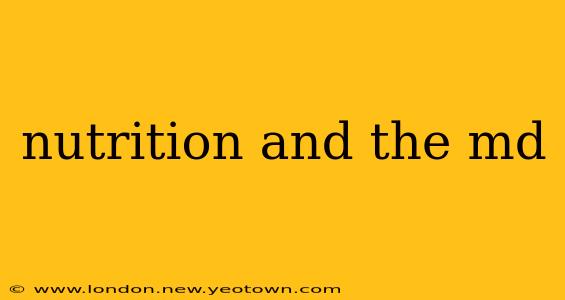Nutrition and the MD: A Doctor's Perspective on Diet and Health
The relationship between nutrition and a medical doctor (MD) is more crucial than ever. In the past, many doctors might have offered cursory advice on diet, but the growing understanding of the profound impact of nutrition on overall health has shifted this dynamic considerably. Today, a holistic approach to healthcare increasingly involves a detailed discussion of diet and lifestyle choices alongside traditional medical treatments. This isn't simply about weight management; it's about preventing disease, managing chronic conditions, and improving quality of life.
Let's delve into this vital connection, exploring common questions and misconceptions surrounding nutrition and the role of the MD.
What role does nutrition play in preventing chronic diseases?
This is a cornerstone of modern preventative medicine. Imagine this: Sarah, a 45-year-old accountant, has a family history of heart disease. Her MD, recognizing this risk factor, doesn't just prescribe medication; they engage in a comprehensive discussion about Sarah's diet. They might advise reducing saturated and trans fats, increasing fiber intake through fruits and vegetables, and encouraging regular physical activity. These dietary changes, alongside other preventative measures, can significantly reduce Sarah's risk of developing heart disease. The same principle applies to conditions like type 2 diabetes, certain cancers, and even some neurological disorders. Nutrition isn't a magic bullet, but it’s a powerful tool in the prevention arsenal.
How does my MD help me manage my chronic condition through nutrition?
For individuals already living with chronic conditions, nutrition becomes even more vital. Let's consider John, a 60-year-old with type 2 diabetes. His MD might work with a registered dietitian to create a personalized meal plan that helps regulate his blood sugar levels. This could involve carefully managing carbohydrate intake, focusing on whole grains and lean proteins, and incorporating specific foods known to improve insulin sensitivity. The MD plays a crucial role in monitoring John's progress, adjusting the dietary plan as needed, and ensuring that any nutritional interventions complement his other medical treatments. This collaborative approach is key to effective chronic disease management.
Should I seek advice from my MD or a registered dietitian regarding my diet?
This is often a question of collaboration, not competition. Your MD provides a broad overview of your health and well-being, identifying potential nutritional needs and risks based on your medical history and current health status. A registered dietitian (RD) then provides the specialized knowledge on creating personalized meal plans and offering detailed guidance on dietary choices. Ideally, they work together, with the MD providing the overall medical context and the RD offering the specific dietary recommendations. The MD can monitor how dietary changes affect your overall health and make necessary adjustments to medication or other treatments, based on the RD's input and your progress.
What are some common misconceptions about nutrition and health?
Many misconceptions abound. The idea of "miracle diets" promising rapid weight loss without lifestyle changes is a common one. These often lack scientific evidence and can even be harmful. Another misconception is that supplements can replace a balanced diet. While some supplements might be beneficial in specific circumstances (always under medical supervision), they shouldn't substitute for a healthy diet rich in whole foods. Your MD can help debunk these myths and guide you towards a sustainable and evidence-based approach to nutrition.
How can I find a doctor who prioritizes nutrition?
Finding an MD who emphasizes preventative care and incorporates nutrition into their practice is becoming increasingly easier. Look for doctors who actively engage in conversations about lifestyle choices, and who might even work with or refer you to registered dietitians. Online reviews and patient testimonials can often offer valuable insights into a doctor's approach to patient care. Consider asking potential doctors directly about their philosophy on nutrition and its role in health management during your initial consultation.
The connection between nutrition and your MD is a partnership focused on your long-term health and well-being. Open communication, a collaborative approach, and a focus on evidence-based practices are crucial for achieving optimal health outcomes. Remember that a healthy diet is not a quick fix but a fundamental pillar of a healthy lifestyle.

